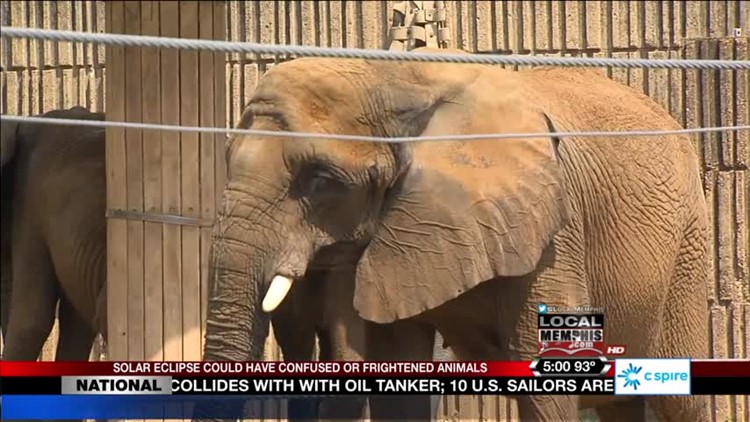Millions of people across the nation and the Mid-South spent Monday afternoon outside with their eyes to the sky on a historic day in space.
We’re of course talking about the first total solar eclipse across the continental United States in 99 years.
Humans weren’t the only ones experiencing it, so too did our furry and feathery friends at the Memphis Zoo.
Staff used the unique occasion to set up observation stations, and get science buffs of all ages engaged and enlightened.
While there were some exception, the animals seemed to handle that rare dose of darkness in the mid-afternoon sun without any major changes in behavior, but this solar eclipse still united, amazed, and inspired zoo visitors from across the Mid-South.
“There’s no words to tell you what I think and how excited I am!” says Jo Fisher.
76-year-old Fisher, along with zoo leaders, gushed with anticipation Monday morning as the moon slowly moved between the sun and earth.
“With that sudden onset of darkness, we are really interested to see what happens,” says Memphis Zoo elephant manager Amanda Schweighart.
But for the zoo’s elephants, the eclipse was nothing to make hay over, rather just chow down on it.
For the other animal attractions, including flamingos, lions, and giraffes, Monday was business as usual on display, even if their human admirers wore a different kind of eyewear.
“It is quite interesting that they seemed to just gone on about their day like a normal cloudy day,” says Lori Moore.
At 1:22 p.m., when Memphis enjoyed a peak 94% total solar eclipse, visitors still enjoyed plenty from the sky, leaving lasting memories for those young or old.
“I’m going to have to say, I always, it’s a great day and like I never mean it because a better day comes, but this has got to be the best day of my whole entire lifetime,” says Sarah Moore.
The Memphis Zoo provided 1,000 free eclipse glasses for visitors. A similar event is expected to be held for the next total solar eclipse, which we won’t have to wait as long for in Memphis, in 2024.
(MEMPHIS ZOO NEWS RELEASE)
Today, Memphis Zoo hosted a Solar Eclipse Watch Party, to mark the arrival of the first full solar eclipse in nearly a century.
There were four observation stations spread throughout the Zoo, allowing visitors to observe if animal behavior changed during the solar eclipse. These observation stations were based off historical data from the last full solar eclipse, 99 years ago. Guests were also encouraged to use the hashtag #MZSolarEclipse for social media.
One observation station was in front of the elephant yard. According to historical information, during the last full solar eclipse, elephants in various locations trumpeted, or made loud vocalizations. While that did not happen, some new behavior was noticed.
“We saw some subtle changes to “Asali’s” behavior,” said Amanda Schweighart, Elephant Manager. “She’s the youngest of our herd, and she went into an “alert” stance, that lasted several seconds. Once she reunited herself with her two herd mates, her behavior returned to normal.”
Zoo staff did note increased activity with a number of other animals, including those located in Zambezi River Hippo Camp. “Binti” and “Winnie,” the mother daughter hippo duo, began acting the way they do when it’s time to come in for the night. This included both animals getting out of the water and playing in the sand area of the exhibit. Once the event was over, they both got back into the water, played more and then fell back into their usual routine of sleeping. Hippos are nocturnal animals.
The Nile crocodiles were very active as well. One curator in the area noted they’d not seen this much activity from them during the crocs time here at the Memphis Zoo. They arrived in early 2016, in anticipation of the opening of Zambezi River Hippo Camp.
Other observations from around the Zoo included:
- African black-footed penguins began vocalizing
- Staff reported that birds throughout the Zoo became very vocal at 1:22 p.m., during the height of the eclipse blockage
- Black bears, on exhibit in Northwest Passage, began running around the exhibit during peak blockage. Once the moon had begun to move away, the bears settled, and went back to sleep
- African Veldt animals, including bongos, ostriches and Grant’s gazelles, were unsure of the time of day. About half the animals on the Veldt began to bed down, beginning their nighttime routine
- “Miraq,” the okapi, returned to his barn, as he normally does at the end of the day
- At 1:22 p.m., Zoo guests began to notice that the majority of the Zoo’s 10 giraffes had begun to move toward their barn



